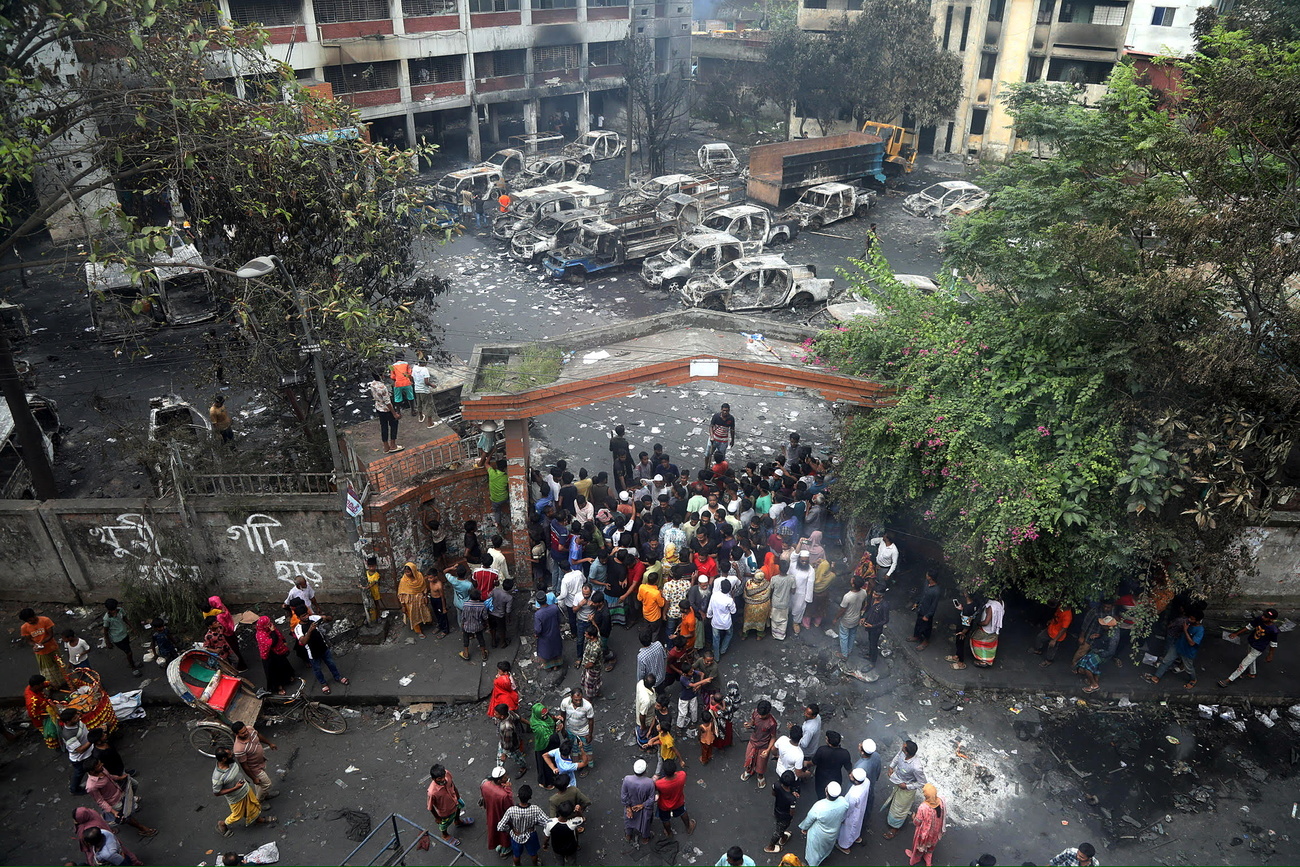
Switzerland closely monitoring Bangladesh amidst political turmoil

Switzerland is "closely following" the current developments in Bangladesh, said the Swiss foreign ministry on the social platform X on Monday. After several weeks of demonstrations, the prime minister left the country on Tuesday, and the army took control.
Switzerland has been “concerned and affected by the unprecedented loss of life since mid-July,” said the Swiss foreign ministry, calling for the respect and protection of the safety of all, including minorities.
Late this afternoon, the Swiss foreign ministry announced that it was now advising against non-urgent travel to Bangladesh.
#BangladeshExternal link | La #SuisseExternal link suit de près les développements actuels au Bangladesh et est préoccupée et attristée par les pertes de vie sans précédent depuis mi-juillet 2024.
— EDA – DFAE (@EDA_DFAE) August 6, 2024External link
Nous soulignons l’importance du calme, de la retenue et, en particulier, de la sécurité de tous, y compris…
UN Chief and the West call for a ‘democratic transition’
The head of the United Nations and Western powers on Monday called for “calm” and a “democratic transition” in Bangladesh, with Washington hailing the role of the army in announcing the formation of an interim government following the flight of Prime Minister Sheikh Hasina.
In a statement, UN Secretary-General Antonio Guterres called for a “peaceful, orderly, and democratic transition” in this South Asian country of 170 million people, an economic partner of the major powers, particularly in the textile industry.
In Washington D.C., US diplomats “urged all parties to refrain from further violence. Too many lives have been lost in recent weeks, and we call for calm and restraint in the days ahead.”
The US State Department welcomed the announcement by the army chief of an interim government, calling for “any transition to take place within the Bangladeshi legal framework.”
When asked about the role of the security forces in the crisis and the transition in Bangladesh, US State Department spokesman Matthew Miller welcomed “reports that the military has resisted calls to repress demonstrators.”
+Switzerland lands in middle of dispute between Mexico and Ecuador
While the army and police have supported the Hasina government throughout the unrest, on Sunday the military and police repeatedly failed to intervene to quell the protests, as they had done previously.
For Miller, “all decisions concerning an interim government must be taken in accordance with democratic principles, the rule of law, and the will of the Bangladeshi people.”
The United Kingdom, a former colonial power before Partition between India and Pakistan, has also called for a return to “calm” and “de-escalation” in the former “East Pakistan,” which became independent Bangladesh in 1971.
+Switzerland to host US-mediated peace talks on Sudan
Prime Minister Sheikh Hasina fled by helicopter on Monday after 15 years in power and a month of deadly protests, prompting army chief General Waker-Uz-Zaman to announce the formation of an interim government.
In the wake of Sunday’s violence, which left around a hundred people dead, 66 people died on Monday, according to police and hospital sources. A total of 366 people have died in clashes in Bangladesh since the protests began in July, according to the news agency AFP, in a report compiled from police, official, and hospital sources.
“We are deeply saddened by reports of human rights abuses, deaths, and injuries over the weekend and in recent weeks,” said State Department spokesman Matthew Miller, while his UN counterpart Farhan Haq called for “independent” investigations into the violence.
+Poll: Swiss divided over Israeli-Palestinian war
The European Union’s head of diplomacy, Josep Borrell, also said in a statement that he was “saddened by the tragic loss of life” and called for an “orderly and peaceful transition to a democratically elected government.”
Canada condemned “the human rights violations” in response to the demonstrations and urged “all parties to respect and ensure respect for democratic institutions” and the rule of law, in a statement issued by the Canadian Minister of Foreign Affairs, Mélanie Joly. The eldest daughter of Sheikh Mujibur Rahman, the founding father of Bangladesh, Sheikh Hasina returned to power in 2009, after a first term between 1996 and 2001.
Translated from German by DeepL/amva
This news story has been written and carefully fact-checked by an external editorial team. At SWI swissinfo.ch we select the most relevant news for an international audience and use automatic translation tools such as DeepL to translate it into English. Providing you with automatically translated news gives us the time to write more in-depth articles.
If you want to know more about how we work, have a look here, if you want to learn more about how we use technology, click here, and if you have feedback on this news story please write to english@swissinfo.ch.

In compliance with the JTI standards
More: SWI swissinfo.ch certified by the Journalism Trust Initiative


























You can find an overview of ongoing debates with our journalists here . Please join us!
If you want to start a conversation about a topic raised in this article or want to report factual errors, email us at english@swissinfo.ch.